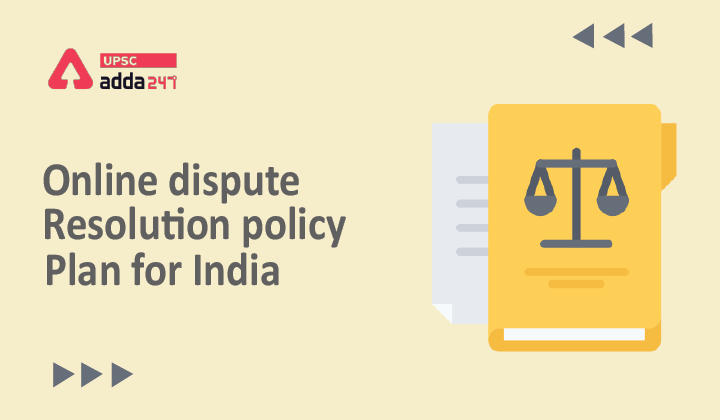Table of Contents
ODR Policy Plan for India: Relevance
- GS 3: Separation of powers between various organs dispute redressal mechanisms and institutions.
ODR Policy Plan for India: Context
- NITI Aayog has recently released a report named ‘Designing the Future of Dispute Resolution: The ODR Policy Plan for India’ to scale dispute avoidance, containment and resolution online.
ODR Policy Plan for India: Key points
- The report is a culmination of the action plan made by a committee constituted at the peak of the COVID crisis by NITI Aayog on ODR in 2020 and chaired by Supreme Court Justice (Retd) AK Sikri.
What is ODR?
- In its most basic sense, ODR is the use of technology to ‘resolve’ disputes.
- ODR is the resolution of disputes, particularly small- and medium-value cases, using digital technology and techniques of ADR, such as arbitration, conciliation and mediation.
- It refers to the process of using technology for dispute avoidance, containment and resolution outside the traditional court system.
- As a dispute resolution avenue, it can be provided both as an extension of the public court system and outside of it.
- World over, the potential of dispute resolution mechanisms, especially through technology, is being recognized.
- Increasingly, ODR has received impetus across Government, businesses and even the judicial processes to tide over the constraints due to Covid-19.
ODR benefits
- It is cost effective, convenient, efficient, allows for customizable processes to be developed and can limit unconscious bias that results from human interactions.
- In terms of layers of justice, ODR can help in dispute avoidance, dispute containment and dispute resolution.
- Its widespread use can improve the legal health of the society, ensure increased enforcement of contracts and thereby improve the Ease of Doing Business Ranking for India.
Why Do We Need ODR?
- The Covid-19 pandemic resulted in a large section of society unable to receive timely access to justice.
- The pandemic also led to a deluge of disputes further burdening the already lengthy court processes.
- ODR has the potential to help reduce the burden on the court and efficiently resolve several categories of cases.
- It may also be integrated to support the judiciary through technology integration in court-annexed Alternate Dispute Resolution (ADR) centres, via e-lok adalats and also be introduced within Government departments for internal disputes.
Adoption of ODR by Government Departments and Ministries
- National Internet Exchange of India’s (NIXI) Domain Dispute Settlement Mechanism.
- Integrated Consumer Grievance Redressal Mechanism (INGRAM) initiative by Department of Consumer Affairs.
- Department of Justice initiated the discourse on the use of ODR to address disputes involving Government bodies by releasing a list of ODR Platforms and urging Government Departments to resolve their disputes online.
- Ministry of Micro, Small and Medium Enterprises launched the SAMADHAAN portal, with facilities for e-filing and online settlement of Micro and Small Enterprises’ (MSE) dues against Public Sector Enterprises.
- Department for Promotion of Industry and Internal Trade (DPIIT) released the Draft National e-commerce Policy.
- In 2019, the Nandan Nilekani led High Level Committee on Deepening Digital Payments, established by the RBI recommended the setting up of a two-tiered ODR system to handle complaints arising out of digital payments.
ODR Policy Plan for India: Recommendations
- The report recommends measures at three levels to tackle challenges in adopting ODR framework in India.
- At the structural level, it suggests actions to increase digital literacy, improve access to digital infrastructure and train professionals as neutrals to deliver ODR services.
- At the behavioural level, the report recommends adoption of ODR to address disputes involving Government departments and ministries.
- At the regulatory level, the report recommends a soft-touch approach to regulate ODR platforms and services.
- This involves laying down design and ethical principles to guide ODR service providers to self-regulate while fostering growth and innovations in the ecosystem.
- The report also stresses on strengthening the existing legislative framework for ODR by introducing necessary amendments to statutes.
- Keeping in mind that the capacity of the ecosystem, which is still largely untested, and technological innovations are still developing, it is recommended that ODR be progressively implemented in a phased manner.
Also Read:
| Women in STEM | SPIN scheme | Shoonya Campaign | Arsenic Found in Wheat, Potato in Rural Bihar |
| Reforms in Urban Planning Capacity in India | Trade and Development Report 2021 | Trade and Development Report 2021 | Euro Green Bond |
| The History of Backward Classes Commission And the Sub-Categorisation of OBCs | Elderly Population Of India: Expert Committee On Longevity Finance | Impact of US Inflation in India | Pradhan Mantri Awas Yojana- Gramin |
| India Rejects WTO Draft on Fishery Subsidy | Supreme Court Allows Legal Sand Mining in Rajasthan | ADR Report on Political Donations | Delhi Declaration on Afghanistan |





 TSPSC Group 1 Question Paper 2024, Downl...
TSPSC Group 1 Question Paper 2024, Downl...
 TSPSC Group 1 Answer key 2024 Out, Downl...
TSPSC Group 1 Answer key 2024 Out, Downl...
 UPSC Prelims 2024 Question Paper, Downlo...
UPSC Prelims 2024 Question Paper, Downlo...
